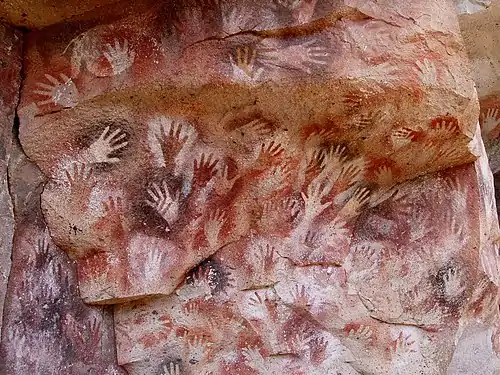Portal:Society
The Society Portal
A society is a group of individuals involved in persistent social interaction, or a large social group sharing the same spatial or social territory, typically subject to the same political authority and dominant cultural expectations. Societies are characterized by patterns of relationships (social relations) between individuals who share a distinctive culture and institutions; a given society may be described as the sum total of such relationships among its constituent members. In the social sciences, a larger society often exhibits stratification or dominance patterns in subgroups.
Societies construct patterns of behavior by deeming certain actions or concepts as acceptable or unacceptable. These patterns of behavior within a given society are known as societal norms. Societies, and their norms, undergo gradual and perpetual changes.
So far as it is collaborative, a society can enable its members to benefit in ways that would otherwise be difficult on an individual basis; both individual and social (common) benefits can thus be distinguished, or in many cases found to overlap. A society can also consist of like-minded people governed by their own norms and values within a dominant, larger society. This is sometimes referred to as a subculture, a term used extensively within criminology, and also applied to distinctive subsections of a larger society.
More broadly, and especially within structuralist thought, a society may be illustrated as an economic, social, industrial or cultural infrastructure, made up of, yet distinct from, a varied collection of individuals. In this regard, society can mean the objective relationships people have with the material world and with other people, rather than "other people" beyond the individual and their familiar social environment. (Full article...)
Selected article

Featured picture
 Credit: Artist: Ethel McClellan Plummer; Restoration: Lise Broer
Credit: Artist: Ethel McClellan Plummer; Restoration: Lise BroerThe cover to the June 1914 issue of Vanity Fair, an American magazine published from 1913 to 1936 by Condé Montrose Nast, the first of many published by his company Condé Nast Publications. Nast purchased a men's fashion magazine titled Dress in 1913 and renamed it Dress, and Vanity Fair. In 1914, the title was shortened to Vanity Fair. During its run, it competed with The New Yorker as the American establishment's top culture chronicle and featured writing by Thomas Wolfe, T. S. Eliot, P. G. Wodehouse, and Dorothy Parker. However, it became a casualty of the Great Depression and declining advertising revenues, and it was folded into Vogue in 1936. In 1983, Condé Nast revived the title as a new publication.
Did you know...

- ... that Mayan eccentrics (pictured) were often buried under monuments and buildings?
- ... that the name of the Nuer White Army, a militant group in South Sudan, reportedly originated from the Nuer youths' use of light-colored insect repellents on their skin?
- ... that the 400 people interviewed for an oral history of MTV's early years could not agree on what was the best video, but they all agreed Billy Squier's "Rock Me Tonite" was the worst?
Anniversaries this month

- 4 April 1930 - Foundation of the American Rocket Society, originally named the American Interplanetary Society
- 13 April 1564 - Pope Pius IV approved the Society of the Holy Name
- 19 April 1866 - First anti-cruelty law was passed since the founding of the American Society for the Prevention of Cruelty to Animals (Brooklyn chapter pictured)
- 22 April 2008 - IEEE Power Engineering Society changed its name to IEEE Power & Energy Society
Selected quote
Selected biography

Featured audio
Categories
|
Society portal Society by continent Society by nationality Sociology Fictional society Anti-social behaviour Business Civil society Clubs and societies Communication Corporate groups Crime Culture Disability Economics Education Social events Family Feminism and society Society in fiction Folklore Health Social history Home Humans Inequality Social institutions Social issues Society-related lists |
Mating systems Matronymics Medicine in society Military Society museums Nationality Organizations Patronymics People Category Philosophy and society not found
Politics Postindustrial society Private law Race and society Religion and society Rural society Science in society Sexuality and society Social change Social media Social responsibility Social sciences Social work Socioeconomics Technology in society Water and society Category Wikipedia books on society not found
Society portals
|
Related portals
Recognized content
Featured articles
 2012 phenomenon
2012 phenomenon 1689 Boston revolt
1689 Boston revolt 1969 Curaçao uprising
1969 Curaçao uprising Digital media use and mental health
Digital media use and mental health Diocletianic Persecution
Diocletianic Persecution W. E. B. Du Bois
W. E. B. Du Bois Female genital mutilation
Female genital mutilation First homosexual movement
First homosexual movement From the Doctor to My Son Thomas
From the Doctor to My Son Thomas Fuck (film)
Fuck (film) Fuck: Word Taboo and Protecting Our First Amendment Liberties
Fuck: Word Taboo and Protecting Our First Amendment Liberties Growing Up Absurd
Growing Up Absurd Homo antecessor
Homo antecessor 1981 Irish hunger strike
1981 Irish hunger strike Theodora Kroeber
Theodora Kroeber Solo Man
Solo Man Rosewood massacre
Rosewood massacre Stonewall riots
Stonewall riots George Washington and slavery
George Washington and slavery
Featured lists
Good articles
 1950s American automobile culture
1950s American automobile culture Timeline of the Egyptian revolution of 2011
Timeline of the Egyptian revolution of 2011 Acting white
Acting white African Americans in Omaha, Nebraska
African Americans in Omaha, Nebraska Agriculture
Agriculture Alfred Kroeber: A Personal Configuration
Alfred Kroeber: A Personal Configuration Algorithmic bias
Algorithmic bias America's 60 Families
America's 60 Families Anarchism
Anarchism Anarchism in Cuba
Anarchism in Cuba Anonymous (hacker group)
Anonymous (hacker group) Anti-nuclear movement in Australia
Anti-nuclear movement in Australia Anna Apostolaki
Anna Apostolaki Archaeoastronomy
Archaeoastronomy Archaeology, Anthropology, and Interstellar Communication
Archaeology, Anthropology, and Interstellar Communication The Archives of the Planet
The Archives of the Planet Aroused (film)
Aroused (film) 2008 attacks on Christians in southern Karnataka
2008 attacks on Christians in southern Karnataka Australopithecus africanus
Australopithecus africanus Australopithecus afarensis
Australopithecus afarensis Australopithecus bahrelghazali
Australopithecus bahrelghazali Australopithecus deyiremeda
Australopithecus deyiremeda Australopithecus garhi
Australopithecus garhi Australopithecus sediba
Australopithecus sediba Balangoda Man
Balangoda Man Before the Dawn (book)
Before the Dawn (book) Birth control
Birth control Black Lives Matter
Black Lives Matter Boerehaat
Boerehaat The Bog People
The Bog People Bomis
Bomis Boston Massacre
Boston Massacre Catilinarian conspiracy
Catilinarian conspiracy Cueva de las Manos
Cueva de las Manos Celebrity Studies
Celebrity Studies Child prostitution
Child prostitution History of Christian thought on persecution and tolerance
History of Christian thought on persecution and tolerance A Community of Witches
A Community of Witches Compulsory Miseducation
Compulsory Miseducation Criminalization of homosexuality
Criminalization of homosexuality Cult film
Cult film Culture of the Song dynasty
Culture of the Song dynasty Cutting the Mustard
Cutting the Mustard Hilda Ellis Davidson
Hilda Ellis Davidson Demographic history of Scotland
Demographic history of Scotland Demographics of the Supreme Court of the United States
Demographics of the Supreme Court of the United States Denisovan
Denisovan Deus Ex: Human Revolution
Deus Ex: Human Revolution Diaphoneme
Diaphoneme Diver communications
Diver communications Dmanisi hominins
Dmanisi hominins Double burden
Double burden Dreamtime (book)
Dreamtime (book) Émile Durkheim
Émile Durkheim EST and The Forum in popular culture
EST and The Forum in popular culture Early European modern humans
Early European modern humans Ely and Littleport riots of 1816
Ely and Littleport riots of 1816 Extremely online
Extremely online Family in the United States
Family in the United States Feminism
Feminism Feminist economics
Feminist economics The finger
The finger Forensic anthropology
Forensic anthropology Fragile Families and Child Wellbeing Study
Fragile Families and Child Wellbeing Study Free Expression Policy Project
Free Expression Policy Project Stephen Fuchs
Stephen Fuchs Genetically modified organism
Genetically modified organism Anca Giurchescu
Anca Giurchescu God's Choice
God's Choice Erving Goffman
Erving Goffman Paul Goodman
Paul Goodman Herto Man
Herto Man Historiography of the Crusades
Historiography of the Crusades History of agriculture
History of agriculture Hitachi Magic Wand
Hitachi Magic Wand Winifred Hoernlé
Winifred Hoernlé Homo rudolfensis
Homo rudolfensis Homo ergaster
Homo ergaster Homo habilis
Homo habilis Homo heidelbergensis
Homo heidelbergensis Homo longi
Homo longi Homo luzonensis
Homo luzonensis Homo naledi
Homo naledi Hooray Henry
Hooray Henry Human
Human Human interactions with insects
Human interactions with insects I Ching
I Ching Globalization and women in China
Globalization and women in China Incel
Incel Ivatan people
Ivatan people 1968–1969 Japanese university protests
1968–1969 Japanese university protests Java Man
Java Man Jewellery of the Berber cultures
Jewellery of the Berber cultures Joint custody (United States)
Joint custody (United States) Kenyanthropus
Kenyanthropus Kirkbride Plan
Kirkbride Plan Language
Language Lantian Man
Lantian Man Ralph Larkin
Ralph Larkin Lesbian
Lesbian Magic, Witchcraft and the Otherworld
Magic, Witchcraft and the Otherworld Bronisław Malinowski
Bronisław Malinowski The Man-Eating Myth
The Man-Eating Myth Man of the Hole
Man of the Hole March for Our Lives Portland
March for Our Lives Portland March for Science Portland
March for Science Portland March of loyalty to martyrs
March of loyalty to martyrs Karl Marx
Karl Marx Josef Mengele
Josef Mengele A More Perfect Union: Advancing New American Rights
A More Perfect Union: Advancing New American Rights Mork Goes Erk
Mork Goes Erk Mountain Meadows Massacre
Mountain Meadows Massacre Myth of the clean Wehrmacht
Myth of the clean Wehrmacht Native American mascot controversy
Native American mascot controversy Neanderthal
Neanderthal New World Order (conspiracy theory)
New World Order (conspiracy theory) No Lifeguard on Duty
No Lifeguard on Duty Not My Presidents Day
Not My Presidents Day Not in Front of the Children
Not in Front of the Children Observations Made During a Voyage Round the World
Observations Made During a Voyage Round the World On the Internet, nobody knows you're a dog
On the Internet, nobody knows you're a dog Otaku
Otaku Ovulatory shift hypothesis
Ovulatory shift hypothesis Paranthropus
Paranthropus Paranthropus aethiopicus
Paranthropus aethiopicus Paranthropus boisei
Paranthropus boisei Paranthropus robustus
Paranthropus robustus Peking Man
Peking Man Political party
Political party Polyethnicity
Polyethnicity Positioning theory
Positioning theory Potential cultural impact of extraterrestrial contact
Potential cultural impact of extraterrestrial contact 1956 Poznań protests
1956 Poznań protests Protests in Canada against the Sri Lankan Civil War
Protests in Canada against the Sri Lankan Civil War Proto-globalization
Proto-globalization Rally to Restore Sanity and/or Fear
Rally to Restore Sanity and/or Fear Aparna Rao
Aparna Rao A Rape on Campus
A Rape on Campus Reborn doll
Reborn doll Herbert Hope Risley
Herbert Hope Risley The Road to Total Freedom
The Road to Total Freedom Romania in the Early Middle Ages
Romania in the Early Middle Ages Rose Street Club
Rose Street Club Royal intermarriage
Royal intermarriage Edward Said
Edward Said Sex, Sin, and Blasphemy
Sex, Sin, and Blasphemy Sheng nu
Sheng nu Silver
Silver Simele massacre
Simele massacre Maria Simon (sociologist)
Maria Simon (sociologist) Kateryna Skarzhynska
Kateryna Skarzhynska Slavery in Haiti
Slavery in Haiti Social identity theory
Social identity theory Sociology
Sociology Sociology of leisure
Sociology of leisure Stay-at-home dad
Stay-at-home dad Stratford Dialectical and Radical Club
Stratford Dialectical and Radical Club Tautavel Man
Tautavel Man Team effectiveness
Team effectiveness Tefillin
Tefillin Think of the children
Think of the children Trance and Dance in Bali
Trance and Dance in Bali Truce term
Truce term Max Weber
Max Weber Weiquan movement
Weiquan movement Whiskey Rebellion
Whiskey Rebellion Who We Are and How We Got Here
Who We Are and How We Got Here Benjamin Lee Whorf
Benjamin Lee Whorf Women's March on Portland
Women's March on Portland Yuanmou Man
Yuanmou Man Florian Znaniecki
Florian Znaniecki
Featured pictures
 20151030 Syrians and Iraq refugees arrive at Skala Sykamias Lesvos Greece 2
20151030 Syrians and Iraq refugees arrive at Skala Sykamias Lesvos Greece 2 Bertillon, Alphonse, fiche anthropométrique recto-verso
Bertillon, Alphonse, fiche anthropométrique recto-verso Cicatrices de flagellation sur un esclave
Cicatrices de flagellation sur un esclave- Daisy (1964)
 DurbanSign1989
DurbanSign1989%252C_1896.jpg.webp) Frances Benjamin Johnston, Self-Portrait (as "New Woman"), 1896
Frances Benjamin Johnston, Self-Portrait (as "New Woman"), 1896 Jane Addams - Bain News Service
Jane Addams - Bain News Service Marine da nang
Marine da nang- Nanook of the North
 SantaCruz-CuevaManos-P2210651b
SantaCruz-CuevaManos-P2210651b United States President Barack Obama bends down to allow the son of a White House staff member to touch his head
United States President Barack Obama bends down to allow the son of a White House staff member to touch his head W.E.B. Du Bois by James E. Purdy, 1907
W.E.B. Du Bois by James E. Purdy, 1907 Xiahe mandible
Xiahe mandible
Things you can do
 |
Here are some tasks awaiting attention:
|
WikiProjects
- Related projects
![]()
- Community
- Ethnic groups
- Family and relationships
- Former countries
- Gender Studies
- LGBT studies
- Literature
- Sexology and sexuality
- Sociology
- Travel and Tourism
Web resources
- Definition of Society from the OED.
- Internet Modern History Sourcebook: Industrial Revolution
- "The Day the World Took Off" Six part video series from the University of Cambridge tracing the question "Why did the Industrial Revolution begin when and where it did."
- BBC History Home Page – Industrial Revolution
- National Museum of Science and Industry website – machines and personalities
- Industrial Revolution and the Standard of Living by Clark Nardinelli - the debate over whether standards of living rose or fell.
Associated Wikimedia
-
 List of all portalsList of all portals
List of all portalsList of all portals -
 The arts portal
The arts portal -
 Biography portal
Biography portal -
 Current events portal
Current events portal -
 Geography portal
Geography portal -
 History portal
History portal -
 Mathematics portal
Mathematics portal -
 Science portal
Science portal -
 Society portal
Society portal -
 Technology portal
Technology portal -
 Random portalRandom portal
Random portalRandom portal -
 WikiProject PortalsWikiProject Portals
WikiProject PortalsWikiProject Portals
